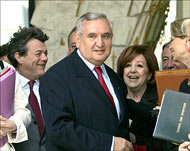EU referendum in France under way
The French have started voting in a referendum on the European Union’s new constitution with Europe watching anxiously after final opinion polls pointed to a rejection that could kill the charter.

The final pre-vote surveys put the “No” camp clearly ahead with up to 56% expected to vote down the treaty on Sunday at the end of a heated campaign that divided France and became a debate on the government’s economic record as well as the future of Europe.
Polling stations opened at 8am (0600 GMT) across mainland France, with the weather fine. About one-in-five voters was left undecided when campaigning ended on Friday.
“Europe at stake,” left-leaning newspaper Liberation declared on the front of its weekend edition above a picture of two dice whose faces spelled out “n-o-n” and “o-u-i”.
Political implications
There is also a great deal at stake for President Jacques Chirac, for whom a rejection of the treaty would be a big setback two years before presidential and parliamentary
elections.
Chirac, 72, has said he will not quit but he would be likely to respond to a “No” vote by dismissing unpopular Prime Minister Jean-Pierre Raffarin. Interior Minister Dominique de Villepin, a trusted ally, leads the race to replace him.
 |
|
Prime Minister Jean-Pierre |
France has lmost 42 million registered voters. First exit polls projecting the result are expected when the last polling stations close at 10pm. The Interior Ministry is
expected to issue an official estimate for the result sometime after 11pm.
Many commentators expect the outcome to be extremely close in voting that began in overseas French territories on Saturday.
The constitution was signed by EU leaders last October in Rome after long and tough negotiations. It sets rules for the EU that are intended to make decision-making easier after the bloc’s enlargement from 15 to 25 member states in May 2004.
The charter requires the approval of all member states to go into force. If it were rejected, the EU would continue to operate under its current rules, but they were designed for a smaller union and voting could soon become paralysed.